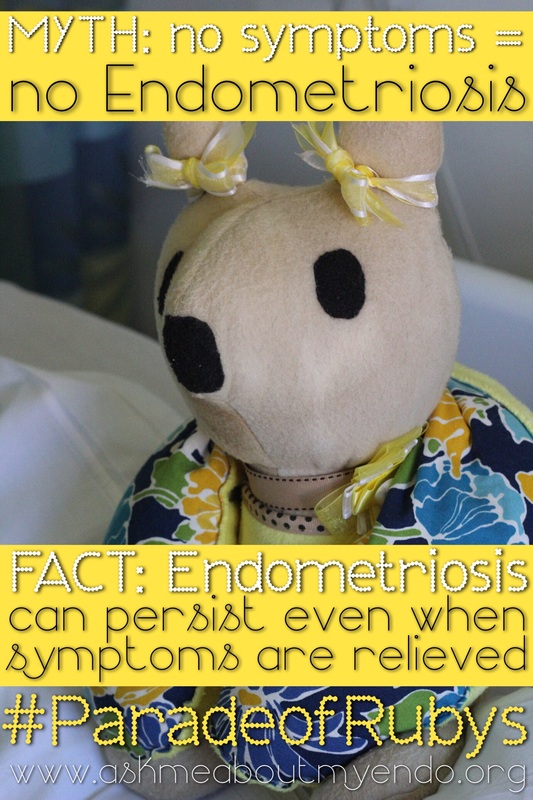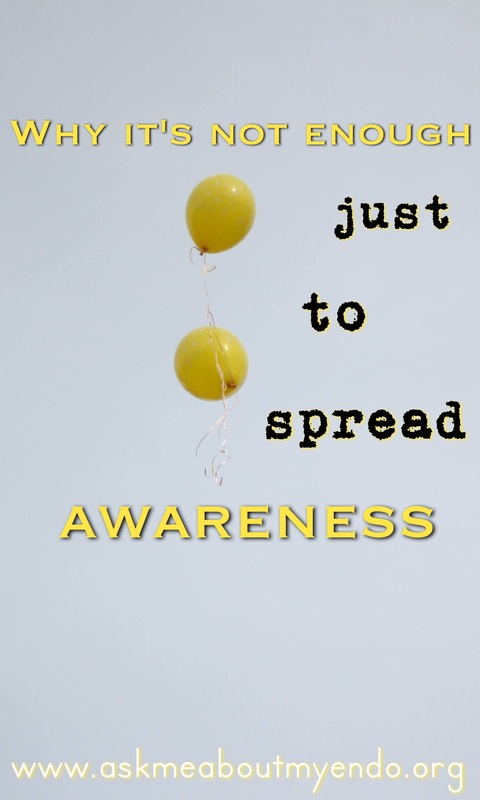This is something that I was led to believe by doctors for years, or at least led to believe that I was keeping my Endometriosis from growing and progressing. I stayed in medical menopause for almost five years, enduring horrible symptoms like fatigue, excessive weight gain, depression, and eventually bone loss because I was told that it would keep my disease from getting worse. I was even told that staying in medical menopause would preserve my fertility.
All of this was false. Efforts to reduce inflammation, suppress estrogen production, and "starve" the Endometriosis can mask or relieve symptoms. I believed that my disease was being controlled because I wasn't having severe pain, and my ovaries weren't producing cysts. At one point, I joined an online support group because the side effects of my suppression were starting to overwhelm me. I hoped that my Endo Sisters might help me find a way to relieve the side effects, or at least to deal with the emotional aspects of being in menopause in my twenties! As I read through the posts by patients just like me, I began to think that all of these women were so much worse off than I was. They were having surgeries left and right, struggling with debilitating pain, some were being pushed to the breaking point by their disease...and I felt sorry for them. I tried to tell them how wonderful it was that my disease wasn't that bad. One woman reached out to me (and I consider her an angel now!) to explain to me about excision surgery...and I promptly left the group. I didn't need that! I was doing great! My disease was under control and when I was ready, I would have my babies and my hormones would "reset" and my Endometriosis would be gone!
Poor, naive 24 year old Kelsey.
As it turned out, when I finally couldn't stand the hot flashes, night sweats, and lack of energy, and came off of hormonal suppression, the pain was mindblowing! I convinced myself that I had just forgotten how painful it was to have a period. It's hard to keep telling yourself that when new symptoms begin, like the stinging, pulling pain I had with every urination during my period, and the stabbing rectal pain during bowel movements, not to mention the weekly, severe bouts of diarrhea that not only kept me in my bathroom for 6 hours at a time, but also caused some of the worst pain and fainting spells I had ever had.
It became clear that my disease had not been controlled. I soon found out that my fertility most certainly was NOT preserved (I couldn't even ovulate on my own once I started trying to conceive). Everything I had been told since I had heard the word Endometriosis had turned out to be a myth.
Most medical treatment options are based on the notion that Endometriosis is just transplanted endometrium, cells that escaped the uterus and implanted elsewhere. Extensive research, however, has proven that Endometriosis is not the same as endometrium. It is pathologically and histologically different. Endometriosis has the ability to produce its own estrogen, so even when we are on medical treatments, which attempt to cut off the fuel source that feeds endometriosis, it can continue to grow and progress. The sad part is, we may not even be aware that it is happening. Like 24 year old me, many patients and even some doctors believe that their Endometriosis is being controlled or even cured because their symptoms have stopped. I was told by one fertility specialist that he had "cured" many of his patients by helping them get pregnant (by the way, if a doctor ever claims this...run!).
But why is it so important to bust this myth? If the patient doesn't have symptoms, who cares?! She is able to get back to her life, and perhaps she doesn't have many side effects. Perhaps she has found a way to control her disease that works for her. That's the goal in this life with Endometriosis; to break free from the chains it has placed upon us and continue to live happy, productive lives.
It is important because laparoscopic surgery and pathological analysis is the only way to diagnose Endometriosis. Endometriosis cannot be diagnosed based on a patient's response to hormonal suppression. I'm passionate about this because I know what it is like to take one medication after another, to be told it is "too early" for surgery, and meanwhile live a life in which I can't even stand to be in my own skin. I know what it is like to be on the other side of that scenario, when the treatment either stops working or I choose to stop taking it. Endometriosis fell back upon me like a ton of bricks, but it was 100 times worse than it had been before. My disease progressed while my symptoms were under control. By the time I had surgical intervention, my Endometriosis had been left to grow inside my body for 14 years. The damage was done. I've come out on the other side, I've had excision surgery, but chronic adhesions, multiple surgeries, and damaged or removed organs continue to leave their mark on my life, and my health record.
Women with Endometriosis are being seen as a billion dollar industry, a market to be tapped. Keeping our disease inside our bodies, instead of cutting it out root to tip and sending it off to be analyzed by pathology ensures that we will continue to require treatments, many of which are exceptionally expensive and can cause long term damage to our bodies. There are people out there claiming to have a magic cure, and women who are desperate to try anything, only to find they've spent money on false hope. There are even people out there who are charging exorbitant amounts of money to teach us to love our Endometriosis away, to reconnect with our "womanhood" and unload our emotional baggage that is "manifesting" as pain in our pelvises.
Comprehensive care, provided by licensed professionals and coordinated with an expertly trained Endometriosis specialist, can improve symptoms, quality of life, and our ability to manage life with a chronic illness. Any technique that can legitimately improve our lives in worth trying, and every body is different. Each program should be individually tailored to the patient. The key to remember is that symptom management does not equal a cure for Endometriosis. Through comprehensive care, including a team of specialists in excision surgery, nutrition, physical therapy, and more, we can strive for higher quality of life and healing. The first step is dispelling myths and focusing on effective treatment options.



 RSS Feed
RSS Feed